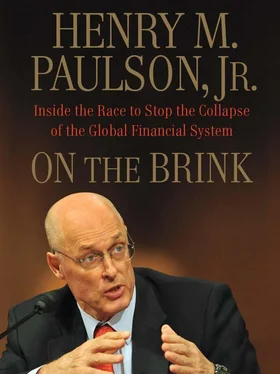Rahm was right, as was Kent Conrad, who added, “We need something to go back and sell on executive comp.”
But there were too many competing voices to make progress. There was a similarly wide range of opinion on oversight matters, as well. Baucus wanted an inspector general specifically for TARP. Others wanted a congressional overseer; Conrad was pushing a Financial Stability Oversight Board, comprising me, Ben Bernanke, Chris Cox, Jim Lockhart, and HUD Secretary Steve Preston. We debated how closely this board would be involved in day-to-day activities. Everyone conceded that there were too many oversight bodies being proposed, but no one wanted to give up his favorite.
“We trust you,” Conrad assured me. “This isn’t aimed at you personally. We need more oversight.”
“I welcome it,” I responded. In fact, I thought strong oversight would protect TARP, and I was fine with Conrad’s idea of a board, although I pointed out that it ought to be consultative. If it got involved in micromanaging executive decisions, nothing would get done. “Let’s get oversight that works,” I said.
I wish now that I’d put my foot down and insisted on dropping one of those redundant oversight bodies, if only to save taxpayers money and make the program more workable. We would end up getting them all, and TARP was already under the eye of the Treasury’s existing inspector general’s office—not to mention the Government Accountability Office (GAO), Congress’s investigative arm, as well as numerous congressional committees.
In the middle of the meeting, House members had to leave to vote on a nuclear cooperation agreement between the U.S. and India. (It passed.) The senators, meanwhile, probed the specifics of the TARP plan, pressing on the $700 billion figure. How did we arrive at that number? I said it was the best estimate we could come up with, and the market would accept no less.
When the House members returned, we turned to the stickiest issue of the afternoon: the timing of the release of the TARP money. The Democrats were fairly certain Obama would win the election, and they didn’t want the Bush Treasury to be able to use all the money. They wanted to give us $250 billion or $300 billion and leave the new administration a say over the rest.
Chuck Schumer didn’t believe Congress would be willing to give the Bush administration $700 billion. I told him the markets needed to know the money was available, but he didn’t seem convinced. Treating our back-and-forth like a run-of-the-mill negotiation, he kept saying, “You probably won’t be able to use more than $100 billion.” I was trying hard to communicate with this group, and they with me, but we couldn’t seem to break through to one another, and tensions were rising.
I asked what would happen if we urgently needed more funds and didn’t have time to go back to Congress to ask for them. Barney quipped, “Then you’ll go back to Uncle Ben.” His one-liner broke the tension and gave us all a much-needed laugh.
Then Schumer said: “If you need more than $350 billion before January 20, you’ll use the Fed or call us back and ask for more.”
“You’re raising a congressional concern, but we need to protect the American people from financial disaster,” I said. “Geithner, Bernanke, and Warren Buffett will say your way won’t work.”
“You keep asserting that, but I don’t hear persuasive reasons. Explain to us why,” Max Baucus said.
I described again the terrible state of the markets. It was clear to me that we would need at least as much money as we were asking for and that it was crucial we send an unambiguous signal to the markets that the funds would be available unimpeded by any political concerns.
After a couple of hours, we broke for dinner, without having made progress on a single issue. Dodd wanted to return to this bargaining format later, but once away, I didn’t want to go back. In truth, the meeting seemed like a setup: these weren’t negotiations, they were just arguments. We were getting nowhere on the release of TARP money, and I felt that we were getting beaten up by a leaderless group of posturing Democratic senators. The fact that they had suggested that this same group should reconvene later meant to me that they either didn’t want, or didn’t know how, to reach a deal. We needed to break the logjam.
We adjourned to John Boehner’s conference room. I called Pelosi, Obama, and Reid, who was out of the building. There were just too many cooks in the kitchen, I said. The compensation proposals were unreasonable, and I believed they would backfire. I told Obama that his guys were blowing the negotiations, seemingly trying to one-up each other. He told me he would talk with Chris Dodd, then called me back about 45 minutes later to tell me that Dodd was optimistic that there had been progress.
A few days earlier, Obama had said to me, in one of our frequent calls, “Hank, I intend to be president, and I don’t want to preside over an economic wasteland. So let me know if we ever get to the point that I need to step in.” With TARP—and the safety of the financial system—on the line, I believed we had reached that point and I told him so. “These negotiations are a disaster,” I said. “The Senate Democrats aren’t taking them seriously. They don’t seem to understand the gravity of the situation.” I learned later that Obama called Harry Reid, who joined the negotiations later that evening.
My team and I decided to approach Barney Frank, who understood how important it was for TARP to be approved and that we would need GOP votes to get it done. Dan Meyer and Kevin Fromer found him on the third floor having dinner with his partner, Jim Ready, and asked him to meet with us.
Barney said he thought the two sides had been making progress, but when Dan and Kevin explained our view that it would be counterproductive to restart the previous meeting, he agreed to come to Boehner’s office to meet with me.
The discussion with Barney was much more productive than the afternoon session. With Keith Hennessey and Judd Gregg, we tackled the issue of tranching and quickly reached a breakthrough on the release of funds. Congress would release an initial $250 billion that could be increased to $350 billion if the president certified to Congress that it was necessary. To release the remaining $350 billion, Treasury would have to submit a report to Congress with details of its plans for the money. If Congress did nothing, the money would be released automatically after 15 days. To withhold the funds, Congress would have to pass legislation denying the release, then override a presidential veto.
Building on that success, we decided to try a new strategy for the night. We would separate the Democrats, treat each like a king, and hammer away in private on individual issues. We began a night of shuttle diplomacy. Negotiators crisscrossed the elegant marble expanse of the Capitol’s National Statuary Hall, once the meeting place of the House, to reach Boehner’s personal office, where we had set up our base.
While we were on Capitol Hill negotiating, FDIC and Fed officials were scrambling, as they had been all day, to find a buyer for Wachovia. The big bank was going down, and as I said to Judd Gregg during a break in the talks: “We’re doing this, but I can’t help thinking about Wachovia.” I knew that Wells Fargo and Citi had emerged as leading contenders for the North Carolina bank. Just before 8:00 p.m., I spoke to Sheila Bair to find out what was happening. She was optimistic, but nothing was going to be announced that day. Like Tim Geithner, she thought Wells Fargo was the most likely buyer.
Rahm Emanuel, playing a hugely constructive role, rushed back and forth between Pelosi and us on the industry tax issue, which we knew would defeat the point of our intervention. Charging the industry for the cost to the government of buying bad assets would only saddle banks with the very losses we knew they couldn’t bear. Rahm obviously didn’t like the idea, either. But when he tried to reach a compromise with us, a Pelosi staff member said no. At one point Rahm thought we were going to have to give in, and he tried to go around me to Josh Bolten, who told him the White House wouldn’t undercut me. We held firm.
Читать дальше












